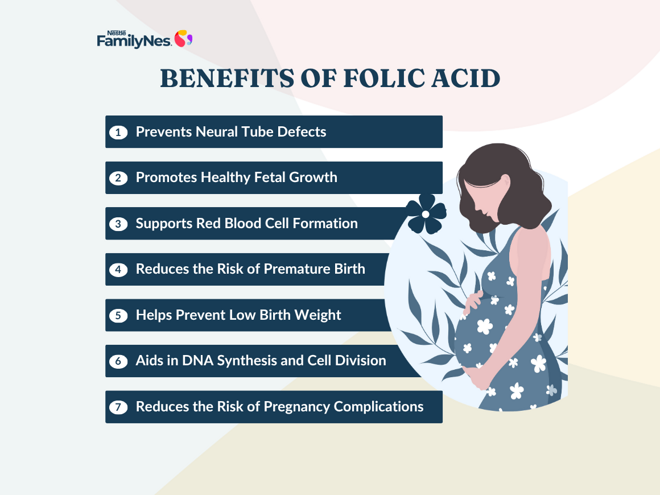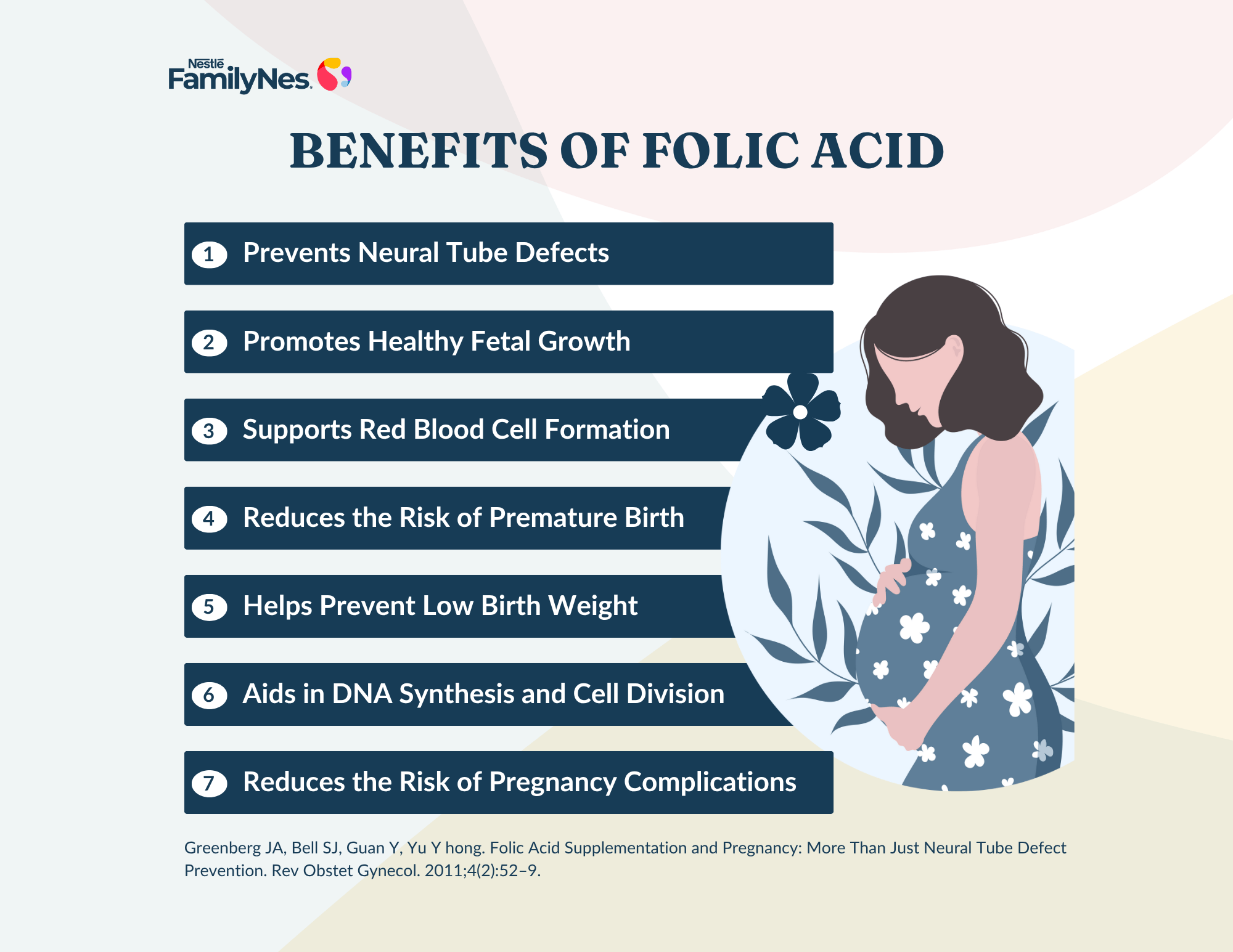
Becoming a mother is one of the most beautiful journeys you’ll ever embark on. As you nurture a new life in you, taking care of your body becomes more important than ever. One of the key nutrients that support a healthy pregnancy is folic acid—a form of vitamin B9. Often recommended even before you conceive, folic acid plays a crucial role in supporting your health and baby’s development. Folic acid does more than just support your baby’s healthy growth; it also gets your body ready for pregnancy and aids in your recovery after giving birth. It’s an essential ally that stays with you every step of the way on your motherhood journey.1
Why does folic acid matter so much?
Folic acid plays a crucial role in helping your body create new cells whether they’re blood cells, brain cells, skin, hair, or nail cells. Folate (the natural form of folic acid) is essential for the healthy growth and maintenance of every new cell in the body.2
During early pregnancy, folic acid becomes even more important. It supports the development of the neural tube, the structure that eventually forms your baby’s brain and spinal cord. Folic acid is the only form of folate proven to reduce the risk of serious birth defects known as Neural Tube Defects (NTDs).1,3 These defects include conditions like anencephaly (a life-threatening condition where parts of the baby’s brain and skull are missing) and spina bifida (where the neural tube doesn’t form properly or close completely, potentially causing nerve damage).4,5 Folic acid plays an important role in DNA synthesis (each time your baby’s cell grows, DNA is copied to ensure healthy development) which is essential for cell growth and division. Once you take folic acid, your body changes it into an active form (5-MTHF- 5, Methylenetetrahydrofolate), which works with vitamin B12 to support essential biological processes, including making important proteins and keeping your baby’s development on track.6

When should you start taking folic acid?
Ideally, you should begin taking folic acid at least one month before conception and continue through the first trimester. Many health experts recommend continuing it throughout your pregnancy since it offers additional benefits. However, it’s important to speak with your healthcare provider to determine the right dosage for you, especially if you have specific risk factors or health concerns.
If you’re planning for pregnancy or are of childbearing age, it’s advised to take folic acid daily even if you’re not trying to conceive yet. This is because neural tube development happens within the first 28 days of pregnancy, often before women realize they’re pregnant.3,7
Where can you get folic acid?
You can find the natural form of folic acid (folate) in a variety of foods such as:3,8
Green leafy vegetables-
- spinach,
- mustard leaves,
- amaranth leaves,
- broccoli
Other foods-
- citrus fruits,
- beans,
- chickpeas,
- lentils,
- whole grains,
- nuts like almonds, peanuts, and walnuts provide a healthy dose of folate,
- Sunflower seeds and paneer are another excellent option, offering a significant amount of this important B vitamin.
However, since our bodies can’t produce folic acid on their own and it can be challenging to get the recommended amount from food alone, most women especially during pregnancy are advised to take folic acid supplements.
Taking folic acid is one of the simplest, most effective things you can do for your baby’s health. If you’re planning a pregnancy or already expecting, talk to your healthcare provider about the right dosage for you. Your journey to motherhood deserves the best start—and folic acid ensures just that.
This content is not a substitute for professional medical advice. Please consult your healthcare professional
References
- Greenberg JA, Bell SJ, Guan Y, Yu Y hong. Folic Acid Supplementation and Pregnancy: More Than Just Neural Tube Defect Prevention. Rev Obstet Gynecol. 2011;4(2):52-59.
- CDC. About Folic Acid. Folic Acid. February 1, 2025. Accessed March 24, 2025. https://www.cdc.gov/folic-acid/about/index.html
- Indian Pediatrics - Editorial. Accessed March 24, 2025. https://www.indianpediatrics.net/june2004/june-577-586.htm
- CDC. Anencephaly. Birth Defects. January 30, 2025. Accessed March 24, 2025. https://www.cdc.gov/birth-defects/about/anencephaly.html
- CDC. About Spina Bifida. Spina Bifida. January 2, 2025. Accessed March 24, 2025. https://www.cdc.gov/spina-bifida/about/index.html
- Seyoum Tola F. The concept of folic acid supplementation and its role in prevention of neural tube defect among pregnant women: PRISMA. Medicine (Baltimore). 2024;103(19):e38154. doi:10.1097/MD.0000000000038154


